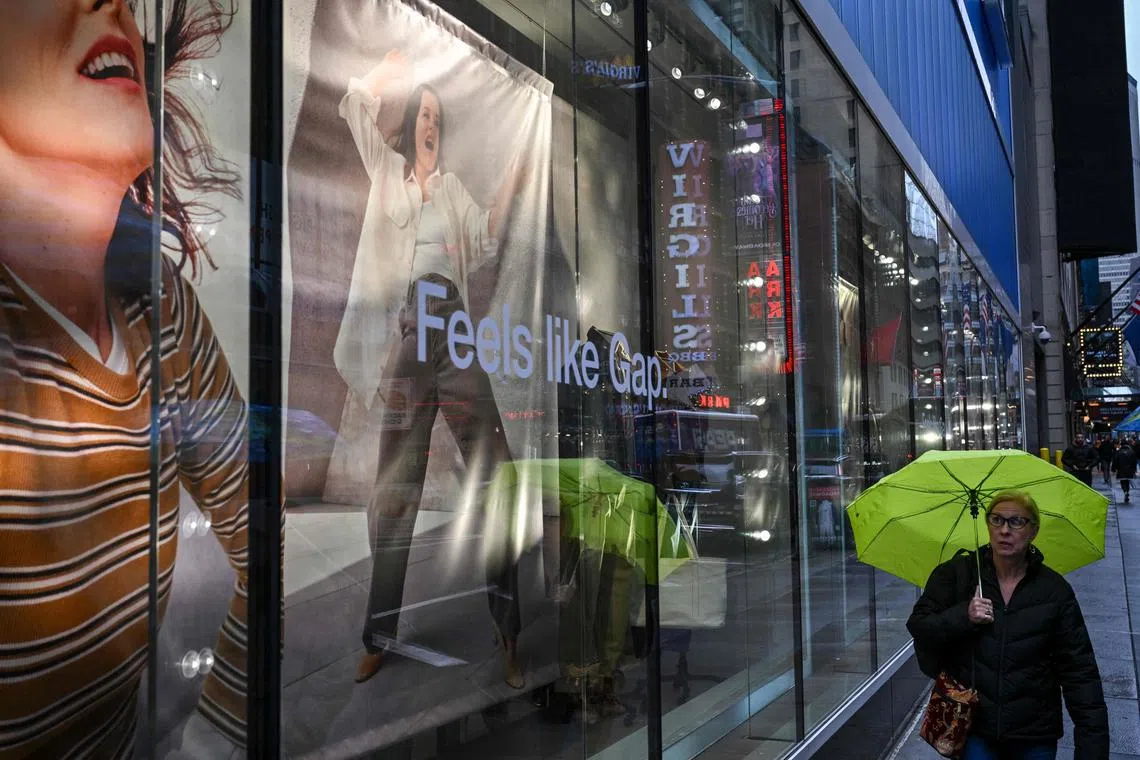US Fed officials see higher inflation ahead as consumer confidence plunges
Sign up now: Get ST's newsletters delivered to your inbox

A widely-referenced consumer confidence survey from the University of Michigan noted a sharp drop in consumer confidence.
PHOTO: AFP
WASHINGTON - Policymakers at the US Federal Reserve on April 11 warned of higher inflation and slower growth ahead due to Mr Donald Trump’s tariff policy, which has sent shock waves through global markets.
The US president imposed sweeping import taxes on dozens of countries, only to abruptly roll many of them back totalling 145 per cent.
Speaking to Yahoo Finance on April 11, Boston Fed president Susan Collins said she expects higher inflation and slower growth this year thanks to the tariffs, echoing the comments of many of her colleagues on the US central bank’s rate-setting committee.
“The higher the tariffs are, the more the potential slowdown in growth as well as elevation and inflation that one would expect,” she said, adding she expects inflation to rise “well above” 3 per cent this year, but no “significant” economic downturn.
“At this point, my expectation is that we are likely to have to hold for longer than I had before,” she said of the Fed’s interest rates.
Shortly after Ms Collins’ interview, a widely-referenced consumer confidence survey from the University of Michigan noted a sharp drop in consumer confidence, and flagged a worrying rise in both short-term and longer-term inflation expectations.
“Year-ahead inflation expectations surged from 5 per cent last month to 6.7 per cent this month, the highest reading since 1981,” the survey noted.
“Long-run inflation expectations climbed from 4.1 per cent in March to 4.4 per cent in April, reflecting a particularly large jump among independents,” it added.
‘Near-term risks’
In a speech in Hot Springs, Arkansas, on April 11, St Louis Fed President Alberto Musalem said “continued vigilance” and “careful monitoring” of the incoming data was needed, amid the tariff-related turbulence.
“I expect the economic expansion will continue at a more moderate pace, the supply and demand for labour will remain roughly in balance, and inflation will decline to 2 per cent over the medium term,” he said, referring to the Fed’s long-term inflation target.
“However, I see the near-term risks as skewed towards inflation rising alongside slower economic growth and a further cooling of the labour market,” added Mr Musalem, who is a voting member of the Fed’s rate-setting committee this year.
“I would be wary of assuming the impact of high tariffs on inflation would be only brief or limited,” he said.
New York Fed president John Williams, a colleague of Mr Musalem and Ms Collins on the Fed’s rate-setting committee, went further on April 11, putting out estimates of how he expects Mr Trump’s immigration and tariff policies – and the uncertainty around them – to affect the US economy this year.
“I now expect real GDP growth will slow considerably from last year’s pace, likely to somewhat below 1 per cent,” he told a conference in Puerto Rico, according to prepared remarks.
“With this downshift in the pace of growth... I expect the unemployment rate to rise from its current level of 4.2 per cent to between 4.5 and 5 per cent over the next year,” he said.
“I expect increased tariffs to boost inflation this year to somewhere between 3.5 and 4 per cent,” he added. AFP


